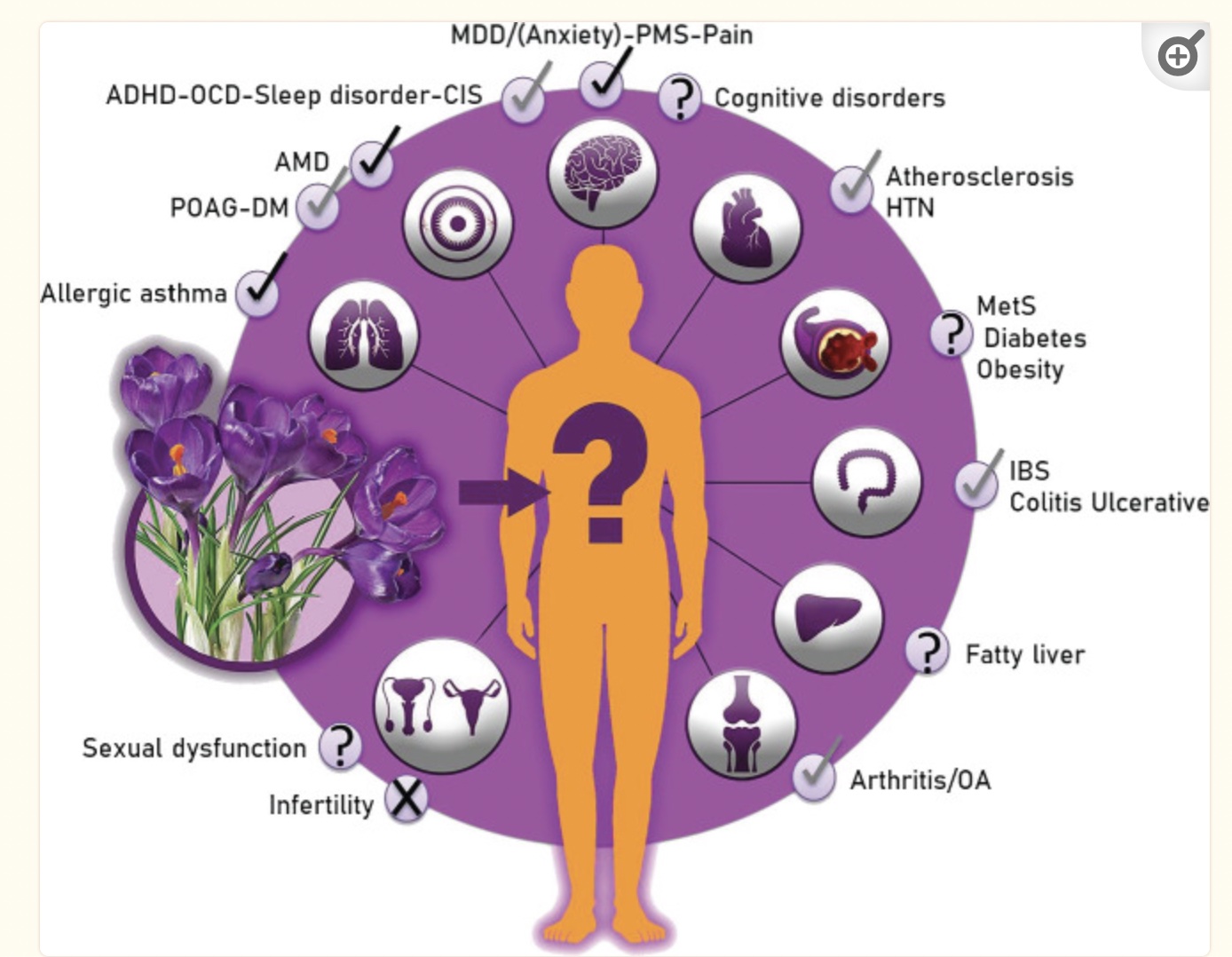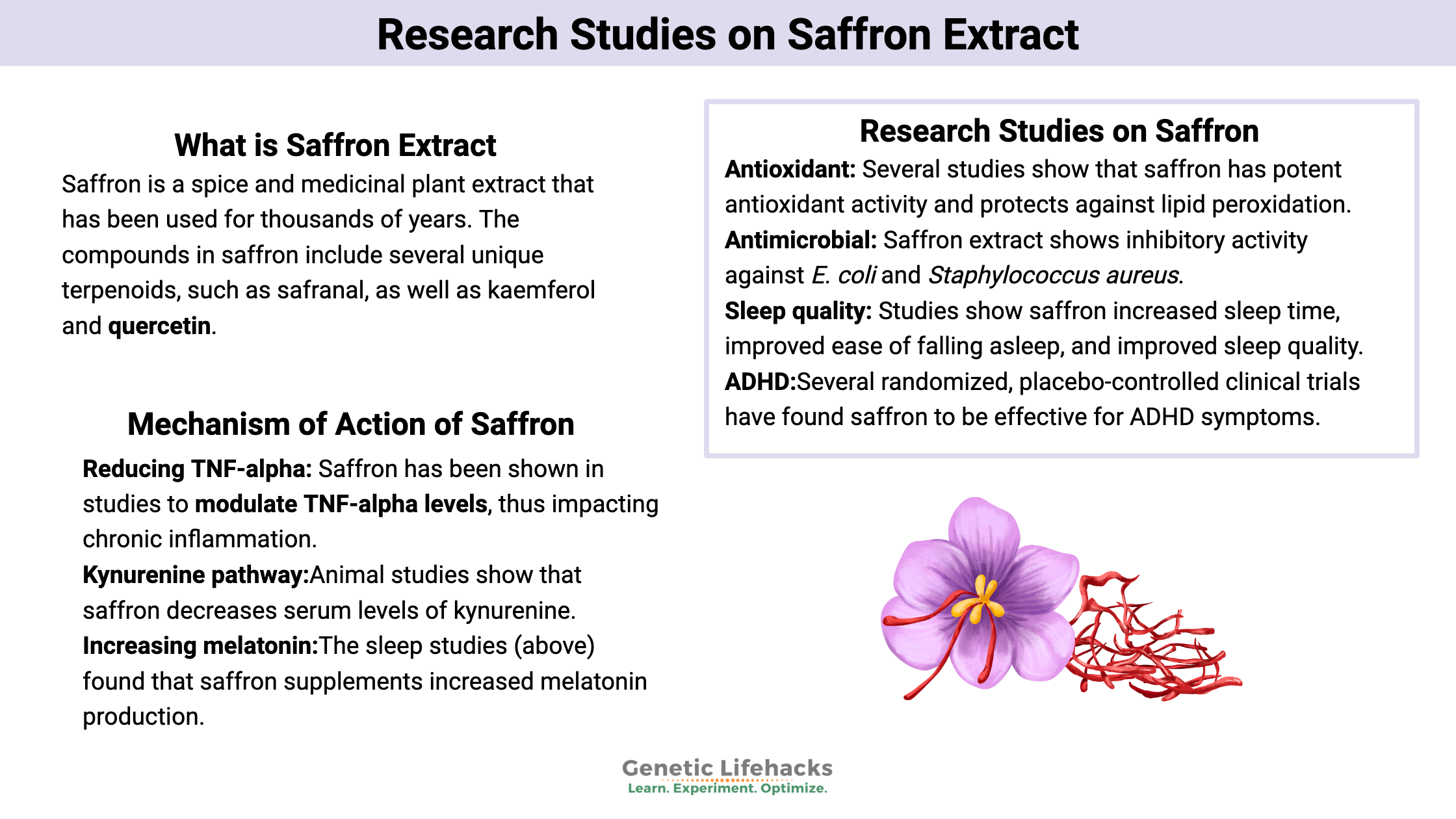Key takeaways:
~ Saffron is a spice and medicinal plant extract that has been used for thousands of years.
~ Recent clinical trials show that saffron extract is as effective as standard medications in some people for ADHD, Alzheimer’s, major depressive disorder, and high cholesterol.
What is saffron extract?
 Saffron comes from the stigmas of the flower of Crocus sativus L. The known use of saffron dates back to the Minoan civilization in Crete some 4,000 years ago, but some records date its use as far back as the 12th century BC. Historically, it has been used as a spice and medicinal food throughout India, Europe, and the Middle East.
Saffron comes from the stigmas of the flower of Crocus sativus L. The known use of saffron dates back to the Minoan civilization in Crete some 4,000 years ago, but some records date its use as far back as the 12th century BC. Historically, it has been used as a spice and medicinal food throughout India, Europe, and the Middle East.
The compounds in saffron include several unique terpenoids, such as safranal, as well as kaemferol and quercetin. The distinctive color comes from the carotenoid content of saffron. All of these combine to give saffron health-promoting properties as well as antimicrobial properties when added to foods as a spice.[ref][ref]

Research studies on saffron or saffron extract:
Antioxidant:
Oxidative stress in cells is at the heart of most chronic diseases. Several studies show that saffron has potent antioxidant activity and protects against lipid peroxidation.[ref][ref] Saffron is also a free-radical scavenger and iron-reducing antioxidant.[ref]
Antimicrobial:
Saffron extract shows inhibitory activity against E. coli and Staphylococcus aureus.[ref] However, a second study showed inhibitory only against staph and not E. coli.[ref]
Randomized clinical trial data:
While animal and cell studies are great for demonstrating a mechanism of action and the potential of a supplement or drug, the gold standard is randomized, placebo-controlled clinical trials.
Below are just some of the double-blind, randomized, placebo-controlled clinical trials on saffron for:
- Sleep
- ADHD
- Stress response
- Depression
- Cholesterol and Triglycerides
- Alzheimer’s and MCI
- Blood pressure
- Ulcerative colitis
- Fatigue in MS
- AMD
- Rheumatoid arthritis
- Asthma
- Sexual dysfunction from SSRI

What can you do with this information?
Click through to the referenced study to read the details, and then talk with your doctor if you have any medical questions.
Sleep quality:
A six-week placebo-controlled trial found that saffron extract (15.5 mg/day) was effective for sleep. Study participants who took saffron had increased sleep time, improved ease of falling asleep, and improved sleep quality. [ref] Another study in adults with poor sleep found that 14mg/day of saffron improved sleep quality.[ref] In a dosage study, there was no difference between 14mg/day and 28mg/day in improving sleep quality. Interestingly, saffron supplementation increased evening melatonin concentrations.[ref]
Related article: Sleep and Your Genes
ADHD:
Several randomized, placebo-controlled clinical trials have found saffron to be effective for ADHD symptoms. The trials have included children, adolescents, and adults. One study compared saffron extract with methylphenidate (Ritalin) and found equal efficacy.[ref][ref]
Related article: ADHD Genes
Cortisol and stress response:
In a double-blind, placebo-controlled, randomized, cross-over study, healthy young men underwent an acute stress test after taking 30 mg of saffron extract (Safr’InsideTM). Compared to placebo, saffron reduced peak salivary cortisol and cortisone concentrations.[ref]
Related article: Cortisol and HPA Axis
Mood and depression:
Several clinical trials have examined the efficacy of saffron extract for treating depression.
- In one study, 128 adults with low mood but not diagnosed depression were given a saffron extract (affron) at 28mg/day, 22mg/day, or a placebo for 4 weeks. The results showed that mood improved and anxiety decreased at the 28mg/day dose.[ref]
- For patients with major depressive disorder, a study showed that the combination of curcumin (250mg) plus saffron (15mg/day) was effective in reducing depression scores, especially in people with atypical depression.[ref]
- In a comparison trial, saffron (30mg/day) was as effective as fluoxetine (Prozac) for mild to moderate depression after six weeks.[ref]
- Another study in adults with anxiety and depression looked at a 50mg saffron capsule taken twice a day. This study found that saffron was significantly more effective than placebo in reducing depression scores after 12 weeks. [ref]
- In older adults with major depressive disorder, saffron (60mg/day) was compared to sertraline (Zoloft) for depression. They were found to be equally effective at reducing depression.[ref]
- A study involving postmenopausal women showed that saffron tea significantly improved “happiness”.[ref]
Related article: Genetic pathways and depression root causes
Lowering triglycerides and total cholesterol:
A placebo-controlled trial showed that saffron was remarkably effective in lowering triglycerides and total cholesterol. The intervention group (saffron petal extract, 30mg/day) had an average triglyceride level of 291 at the beginning of the study, which dropped to 177 after four weeks of saffron. LDL cholesterol also dropped by almost 40 points as well (from a baseline average of 137 mg/dL).[ref]
Another study in people with more moderate cholesterol levels found that saffron infusion reduced LDL and triglyceride levels (e.g. total cholesterol from 199 to 179 mg/dL).[ref]
In a study of coronary artery disease, a saffron aqueous extract was found to reduce oxidized LDL levels.[ref]
Related article: Cholesterol and your genes
Alzheimer’s disease:
Several clinical trials in patients with mild to moderate Alzheimer’s disease show that saffron is as effective (or more effective) than standard treatments such as donepezil and memantine.[ref][ref]
A review of animal studies found that “Seventeen in vitro and in vivo preclinical studies have described the efficacy of saffron on cognitive impairment in animal models of AD, highlighting that crocin appears to be able to regulate glutamate levels, reduce oxidative stress, and modulate Aβ and tau protein aggregation.”[ref]
Blood pressure:
In a clinical trial of men aged 60-70 with high blood pressure, a combination of resistance training + saffron reduced blood pressure and positively affected endothelial function.[ref]
Ulcerative colitis:
A placebo-controlled randomized trial in ulcerative colitis patients found that 100mg of saffron/day (not saffron extract) reduced clinical scores and increased antioxidant status.[ref]
Related article: IBD and genetics
Age-related macular degeneration:
In a study of 100 adults with macular degeneration, supplementing with saffron extract (20 mg/day) for three months “modestly improved visual function in participants with AMD, including those using AREDS supplements.”[ref] Another clinical trial found that saffron improved retinal flicker sensitivity in early AMD.[ref]
Related article: AMD genes
Fatigue in Multiple Sclerosis:
One study found that saffron syrup taken three times a day for two months reduced fatigue scores. The results showed that “fatigue severity of the subjects after saffron syrup consumption dropped dramatically for two months.”[ref]
Rheumatoid arthritis:
A placebo-controlled randomized trial found that saffron reduced pain and swollen joints in women with rheumatoid arthritis. The researchers found that women who took saffron also had a decrease in CRP.[ref]
Related article: Rheumatoid arthritis genetic variants
Heat shock protein antibodies:
Antibodies to heat shock proteins (HSP27, HSP70, and HSP65) are associated with metabolic syndrome. A placebo-controlled randomized trial found that 12 weeks of saffron (100 mg/day) reduced antibodies to heat shock proteins (antiHSP27 and antiHSP70).[ref]
Related article: Heat shock proteins
Fluoxetine-induced sexual impairment:
Side effects of SSRIs, such as fluoxetine (Prozac), can include sexual dysfunction in men. A placebo-controlled double-blind study found that saffron extract (15mg/ twice daily) improved sexual function in more than half of the men by week 4. [ref]
PMS:
A placebo-controlled clinical trial in women found that saffron (15 mg / 2x daily) during their menstrual cycle effectively reduced PMS symptoms in 76% of the women after a couple of months. Symptoms were reduced in only 8% of women taking the placebo. [ref]
Asthma:
A clinical trial in adults with allergic asthma found that saffron (100mg/day) decreased the use of rescue medication and asthma severity.[ref]
Safety, Side Effects, and Dosing:
First, saffron is used as a spice and is generally considered safe. It has been used for millennia in low doses. In randomized, placebo-controlled trials, most found either no side effects or minimal side effects similar to placebo.[ref]
Most of the clinical trials listed above used doses of 15 mg, sometimes twice a day.
A safety evaluation study found that doses up to 400 mg were safe, but that at higher doses (400 mg) there was a decrease in standing systolic blood pressure. It also increases sodium, BUN, and creatinine slightly — all still in the normal range and deemed clinically unimportant.[ref]
Another safety study looked at several different markers in the coagulation system (fibrinogen, factor VII, PTT, and more) to see if there was an effect on clotting or bleeding. The study found no differences from placebo at 200 mg or 400 mg of saffron.[ref]
High doses of 1200mg and up may cause side effects such as nausea, vomiting, and bleeding.[ref]
Toxicity studies in animals show that high doses of saffron have toxic effects. In doses in the grams/kg range in animals, saffron does have significant adverse effects. (This is true for many substances, and a good reminder that even spices that are traditionally used can have limits.)[ref]
Cautions: For any supplement or vitamin, please talk with your doctor if you have medical questions or are on a medication, especially one that lowers blood pressure. While I didn’t find any contraindications in the research studies, the notable effects on mood may mean that people with bipolar depression should use caution.
Conclusion:
At lower doses, saffron seems to be a safe natural alternative to several prescription medications for depression, Alzheimer’s, or ADHD. I would like to see more studies on saffron as far as the mechanism of action and interactions with genetic polymorphisms. This is one traditional medicinal food that has quite a lot of solid scientific research on it.

